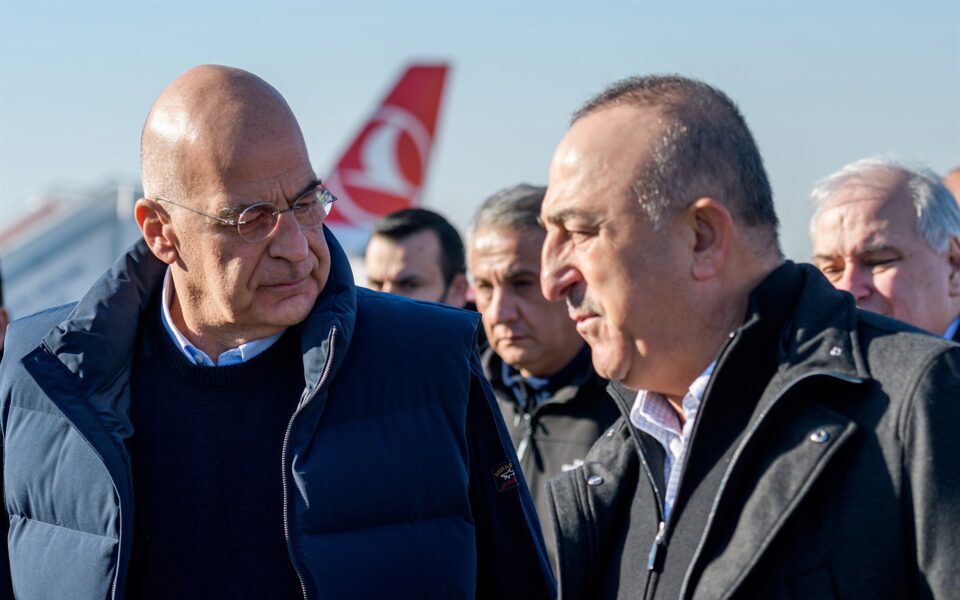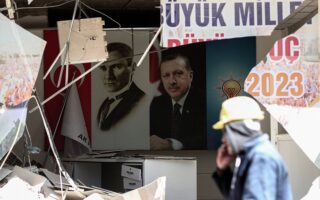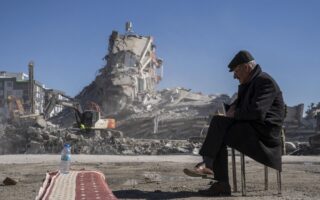Will ‘earthquake diplomacy’ in 2023 be different to 1999?

Can a rapprochement between Greeks and Turks prompted by the latest earthquakes last longer and leave more lasting benefits in relations between the two countries than the “earthquake diplomacy” of 1999? Then, too, we saw sincere expressions of friendship, as Greeks and Turks helped each other deal with the consequences of devastating earthquakes in both countries. And yet, in recent years that time was but a melancholy reminder that despite any feelings of friendship, the problems do not go away.
Turkish President Recep Tayyip Erdogan’s embrace with the hardcore representatives of the deep state provoked ever greater tensions between the two countries. Greece strengthened its position in the European Union and deepened relations with a wide range of countries (the United States, France, Israel, Egypt, Saudi Arabia, the United Arab Emirates, among others), while Turkey developed close ties with Russia and embarked on aggressive policies in every direction, with Greece becoming an almost permanent target of its belligerence. Can the genuine emotions of the past few days bridge this chasm?
Some problems cannot be solved easily. A few are over a century old, while some are raised only by one side – Turkey. However, the two countries can come to a modus vivendi which will benefit their peoples until there comes a time that is more conducive to solutions. Today, several factors allow some optimism that things might improve. Authoritative Turkish observers believe that Erdogan cannot win the elections, whether they are held on May 14 or on June 18, as originally scheduled. Just as the earthquake of 1999 highlighted the incompetence of the secular regime that had ruled Turkey for decades, the latest one fragmented the image of omnipotence that Erdogan had cultivated.
Furthermore, the bureaucracy of the military and security services, already battered by Erdogan’s policies, once again appeared to be inadequate in the face of the latest earthquake. They are in no position to dictate the continuation of an extreme nationalism to the next government.
Indicative of an impending change in direction is the policy adopted by the six opposition parties now known as the National Alliance, in which their foreign policy priority is EU accession. Dialogue with Greece, too, is a priority. This does not mean that the problems will disappear. But it is very clear that Erdogan’s confrontational policies proved a dead end, leading to repeated reversals and lost opportunities. With the economy already in a mess and now obliged to shoulder the unimaginable cost of reconstruction, Turkey is in position to maintain its “muscular” foreign policy. It will have to seek stability and good relations with its neighbors, the EU and its NATO allies.
The elections in Turkey, Greece and Cyprus will all play a significant role in developments. Turkey’s opposition parties had scheduled a meeting on February 13 to discuss their candidate for the presidential election. After the earthquake, the leader of the main opposition CHP, Kemal Kilicdaroglu, has seen his fortunes rise and seems a strong candidate, as his criticism of Erdogan’s anti-seismic policy finds a keen audience.
In Greece there is relative consensus on the need for Turkey to adapt itself to the European acquis, for the good of Turkey, Greece and Cyprus. This means that whatever the outcome of the Greek elections, this country can play a significant role in pushing for closer ties between Turkey and the EU. If, as Prime Minister Kyiakos Mitsotakis has proposed, it also leads in the European conference for assistance to Turkey and Syria, then an era of closer relations between Greeks and Turks may well be established.





